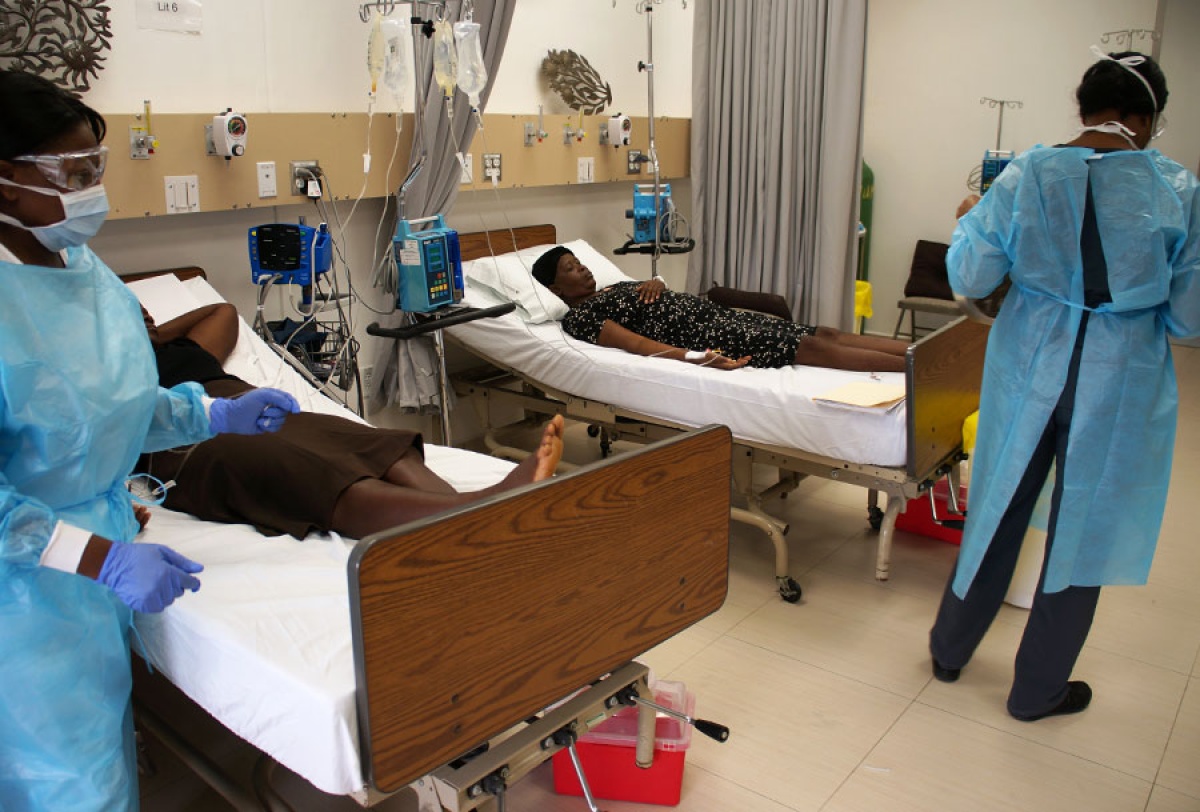Cervical Cancer Program Expands in Haiti
Posted on Jan 29, 2016

Cervical cancer is the most common cancer in women in Haiti, and the second leading cause of cancer deaths among the same group, according to the ICO Information Centre on HPV and Cancer, a data clearinghouse.
This is true in a day and age when cervical cancer can largely be prevented and treated through timely vaccinations and regular gynecological exams. There is no reason that can’t be true in Haiti.
In November, Zanmi Lasante, as Partners In Health is known in Haiti, launched a two-year program that will dramatically increase its capacity to vaccinate young girls and screen and treat women for cervical cancer. Over the next 24 months, staff will vaccinate 20,000 girls in St. Marc, Mirebalais, and Belladère against human papillomavirus (HPV), which causes an infection that has been linked to more than 90 percent of cervical cancer cases worldwide. They will also screen 20,000 more women for cervical cancer in St. Marc and the surrounding area, while boosting efforts to screen and treat women in Mirebalais and Belladère.
Additional staff will be hired and equipment and materials will be purchased to meet increased demand for these gynecological services, most of which will be provided at St. Nicholas Hospital in St. Marc. Pap smears, biopsies, and colposcopy—a procedure used to closely examine the cervix—will also be available for women whose initial tests indicate they may have cancer.
Dr. Jacklin Saint Fleur, an OB-GYN and the director of St. Nicholas Hospital, says there are a number of reasons cervical cancer rates are high in Haiti. Most women don’t have access to basic health care. And those who do often end up at a clinic without adequate staffing, training, and supplies to provide proper care.
The result, says Saint Fleur, is “you have more women who are dying of cervical cancer.” He hopes the new program will help turn the tide.
Scaling up
For years, PIH staff have seen the toll cervical cancer takes on Haitian women and fought back with the tools and training at hand. Through their women’s health program, or Sante Fanm as its known in Kreyol, staff have vaccinated 2,400 girls against HPV in the Central Plateau. Staff also have screened 10,160 women for abnormal cervical cells and treated 1,277 of them over the past four years, primarily in Cange and Mirebalais through out-patient clinics. Patients with confirmed cervical cancer were referred to University Hospital in Mirebalais for surgery, chemotherapy, or palliative care.
While these efforts have been impressive, Sante Fanm staff knew that more could be done, especially when it came to educating the community about HPV and cervical cancer, and how the two are linked.
That’s where PIH’s accompagnateurs, or community health workers, step into the equation. With this new program, they will be trained to reach out to adolescent girls and women in schools, markets, churches, or homes, where they can talk about the importance of HPV vaccinations and cervical cancer screenings. If young patients decide to get vaccinated, accompagnateurs will also be the ones who ensure that they complete their series of two shots.
Meanwhile, PIH staff at five hospitals and clinics will receive training or refresher courses on how to properly screen for cervical cancer. Research has shown that visual inspection with acetic acid is the most effective method where resources are limited. It’s a relatively simple procedure in which a doctor or nurse applies vinegar to a woman’s cervix during a pelvic exam. Any abnormal tissue immediately turns white and is visible with the naked eye.
Screening and immediately treating patients is essential in places like Haiti, where most women don’t have access to regular gynecological care, such as annual Pap smears. Even if a woman did, she would have to take her cell sample to a Port-au-Prince laboratory where it could be tested for abnormalities. She would return weeks later, pay to receive the results, then return to her clinic for a follow-up appointment. This process just simply isn’t feasible for the majority of women, who tend to be caregivers, live far from the capital, and survive on less than $2 a day.
Depending on what clinicians see during a screening, they can treat the patient on the spot or refer them to another facility, such as University Hospital in Mirebalais. Treatment can include freezing the abnormal tissue or delicately slicing it away.
In cases were cervical cancer is confirmed, women are referred to facilities like University Hospital, where they undergo surgery or chemotherapy. Radiation is the preferred treatment, but it doesn’t exist anywhere in Haiti, so patients must travel abroad to receive proper care. PIH’s oncology team has accompanied a handful of patients to the Dominican Republic and supported them with housing, food, and transportation during their months-long stays.
Next steps
PIH knows this is a drop in the bucket. Within reach of PIH facilities, there are 325,000 women of reproductive age who should have regular cervical cancer screenings, and 132,000 girls aged 10 to 14 who should receive the HPV vaccine series, according to Dr. Eddy Jonas, an OB-GYN and the director of the Sante Fanm program. That doesn’t take into account the rest of Haiti, where thousands of women don’t have access to care or can’t afford what is available.
With that in mind, Saint Fleur and a network of colleagues are working with the Ministry of Health to make cervical cancer a national priority.
There’s reason to believe he’ll be successful. He already accomplished the same feat in Rwanda, where PIH has worked for the past decade.

